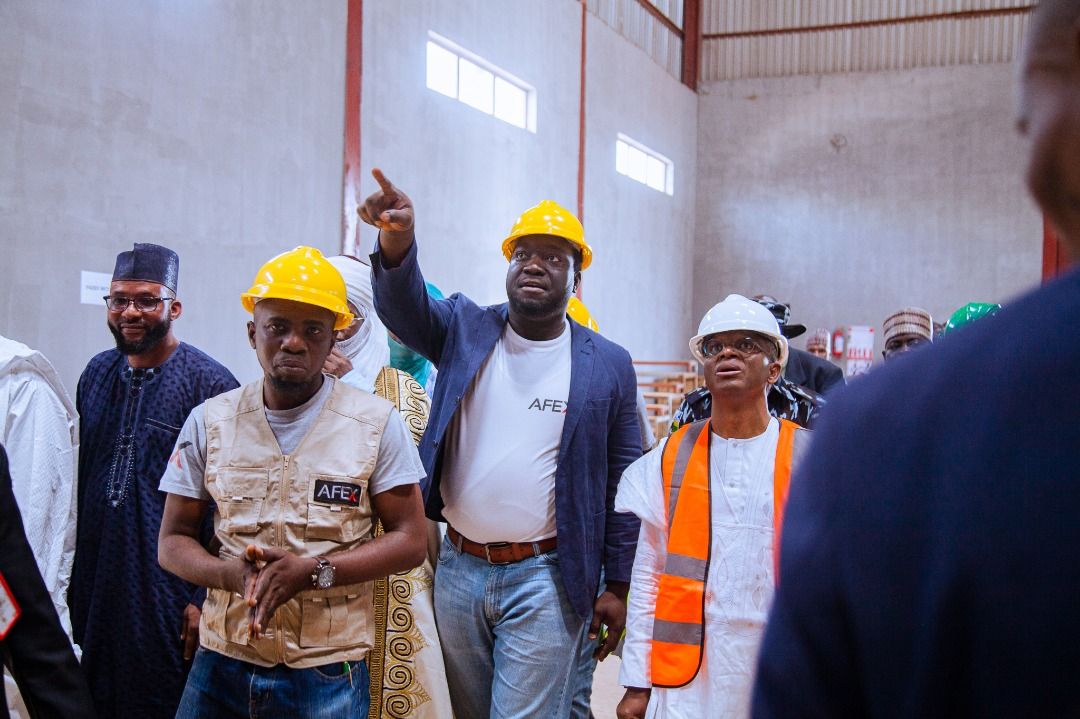Reading time:4 min read
AFEX Celebrates World Food Day with the Launch of 100,000MT/ year Grain Quality Enhancement Center
AFEX, Nigeria’s leading commodities market player, on Friday, marked World Food Day, with the launch of a new 100,000MT/ year Grain Quality Enhancement Center and 30,000 MT storage capacity warehouse at Zaria-Kano Highway, Kaduna State.
The plant represents AFEX’s renewed commitment to infrastructure investments that cut post-harvest losses, strengthen quality and standardization criteria in grain value chains and improve the livelihoods of primary producers who are able to earn higher income on better quality grains. The plant, which has an annual capacity of 100,000MT, meets the challenges of grain quality enhancement through cleaning, grinding, heating, drying, packaging, and storage services for grains like maize, paddy rice, and soybean.
“Over the years, we have seen a growing demand for grain commodities in the animal feed, food, and drink industries. However, 3.5 trillion naira is lost annually after harvest because the national storage capacity can only accommodate 5-7 percent of agricultural produce. At AFEX, we believe that the grain quality enhancement center will help meet that demand, support the closure of quality and quantity gaps, maximize income returns for smallholder farmers, and increase access to markets that will benefit key players in the value chain and society at large. The activities in the processing plant will include quality and quantity checks, packaging, storage, and other processes in the value chain.
This historic milestone aligns with our UN SDG goals 1, 2, 5, 8, and 12. We are working towards resilience and sustainability of the agricultural supply chain to ensure that farmers and growers get a better deal for their produce, everyone has access to affordable and nutritious food, alleviate poverty, and ensure that no one is left behind.
Our partnership with the Kaduna State Government and the USAID-Funded West Africa Trade & Investment Hub has also been instrumental in moving the project forward. We are delighted for their contributions as we continue to explore together the true potential and market opportunities of grains in Nigeria” Commented, CEO, AFEX, Ayodeji Balogun.
Currently, Nigeria’s storage capacities stand at less than 5%, resulting in excessive post-harvest losses, all of which impact food security. To solve the problem, the new facility will strengthen food supply chains, boost grain prices for producers and serve as a reliable source for processed grain meal and hulls in the growing markets whilst bolstering food production in the country. Essentially, by depositing commodities in the warehouse, farmers will be able to pay for the processing services and have access to buyers on the AFEX platform at a higher price.
Speaking on the commissioning of the AFEX Grain Quality Enhancement Center, His Excellency, the Governor of Kaduna State, Mallam Nasiru el-Rufai said “I am happy to see this new development in the agricultural value chain. Oftentimes, when farmers harvest their produce, they sell quickly at low prices to prevent post-harvest loss and in return, they never get the best value. With this center, AFEX has closed the gap in preparation, cleaning, and logistics, helping farmers to sell at the right price.
I am grateful to all the partners behind AFEX, USAID-Funded West Africa Trade & Investment Hub, AGRA, for collaborating on this project and enhancing access to a structured and ready market for farmers and job creation for Nigerian youths.”
Since 2014, AFEX has built a robust network of warehouses to support the growth of agricultural commodities and provide offtake agreements to farmers at market prices with a same-day payment model. Currently, AFEX has a footprint of over 100 warehouses across 23 grain-producing states in Nigeria which accounts for over 300,000 MT of the total national storage capacity. They have reached over 430,000 farmers and traded over 1 million MT of commodities to transform rural households and boost economic prosperity.
With more efficient pricing mechanisms and transparent, fair distribution fees, agricultural producers working with AFEX benefit from significant – and often life-changing – savings on taxes, charges, transportation costs, and better storage/disruption.
